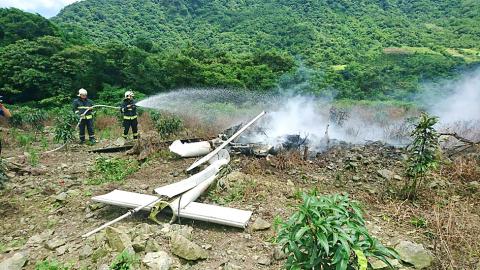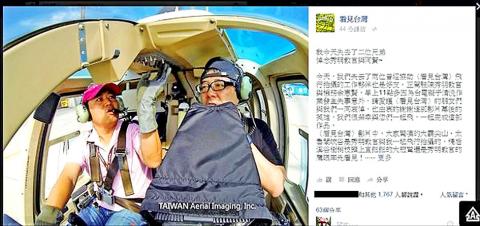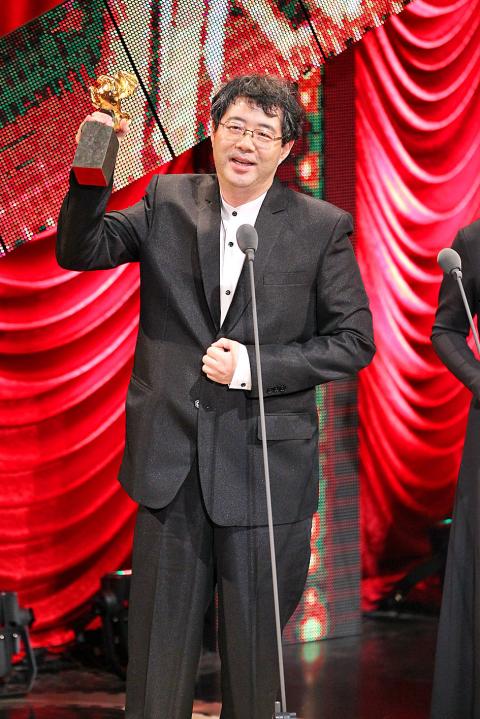Director Chi Po-lin (齊柏林) was among three people who died in a helicopter crash in Hualien County’s Fengbin Township (豐濱) yesterday, the county fire department said.
The department said it received word at 11am that the helicopter had crashed.
Upon arriving at the site, rescuers found the bodies of three people, who have been identified as Chi, 52; his assistant Chen Kuan-chi (陳冠齊), 25; and pilot Chang Chi-kuang (張志光), 53.

Photo: CNA, provided by a member of the public
The helicopter was a Bell 206B-3 owned and operated by Emerald Pacific Airlines (凌天航空), the department said.
Emeral Pacific director of operations Huang Wei-chun (黃為君) said the helicopter had taken off from Chihshang Township (池上) at 10:40am with plans to pass over the Huadong Valley (花東縱谷) and Ruisuei Township (瑞穗) before returning to Chihshang.
“We lost contact with the pilot a little over an hour after the helicopter took off from Chihshang,” Huang said.

Screen grab from the Taiwan From Above Facebook account
Chang had worked for the airline for 11 years and had 5,500 hours of flight experience, Huang said, adding that the helicopter had passed service and maintenance checks in April.
The crew was shooting footage for Chi’s sequel to the documentary Beyond Beauty: Taiwan From Above (看見台灣).
Beyond Beauty was a 2013 box-office hit that documented Taiwan using only aerial footage.

Photo: Wang Wen-lin, Taipei Times
Chi on Thursday held a news conference in Taipei to announce production had begun on the sequel.
He said he would film it using 4K ultra-high-definition or higher resolution and was intending to include footage from Japan, New Zealand, Malaysia and China to convey his idea that environmental protection should not be limited by national borders.
Chi had planned underwater footage to show how human activity is affecting the sea.

Photo provided by Taiwan Above Cinema Inc
Chi on Thursday said that he would not use lower-resolution aerial cameras and would insist on using helicopter-mounted cameras for all shots from the air.
Friends and others expressed shock and disbelief at Chi’s death.
Author Wu Nian-jen (吳念真), who narrated Beyond Beauty, yesterday said that he had spoken with Chi on Friday and offered him encouragement to focus on the filming and not to worry about funding.
“Chi said he would ask me to take a look at the rough footage at some point,” Wu said.
National Chengchi University professor Chen Fang-ming (陳芳明) said it was truly a sad day.
While there are many idealists in the world, and some act on their ideals, Chi was the director he admired the most, he said.
“One feels pride for Taiwan after watching any of the films he directed,” Chen Fang-ming said.
“This generation of Taiwanese has suffered a loss at the passing of Chi, a man who had a conscience and was willing to devote himself to a cause,” said director Lu Chien-chang (盧建彰), who was a friend of Chi’s.
President Tsai Ing-wen (蔡英文) wrote on Facebook that she and all Taiwanese were shocked and saddened at Chi’s passing.
Executive Yuan spokesperson Hsu Kuo-yung (徐國勇) offered the Cabinet’s condolences to the family of the late director, who had worked with the military to document stories of the air force.
Chi began shooting aerial photography during his days at the Ministry of Transportation and Communications, helping document important construction projects, mostly highways.
Chi was deeply moved by the damage Typhoon Morakot wrought upon Siaolin Village (小林) in what was then Kaohsiung County after torrential rain triggered mudslides there in 2008.
The public was unable to get a proper sense of the importance of environmental protection, because they had no access to such footage and scenes, Chi said at the time.
He said it was that experience that led him to shoot Beyond Beauty, adding that he left his job in the public sector to devote his time to creating the documentary.
In 2011, Chi said he hoped to be the eye in the sky for Taiwanese and show them the beautiful scenery he had seen.
The Civil Aeronautics Administration is investigating the crash.

DAREDEVIL: Honnold said it had always been a dream of his to climb Taipei 101, while a Netflix producer said the skyscraper was ‘a real icon of this country’ US climber Alex Honnold yesterday took on Taiwan’s tallest building, becoming the first person to scale Taipei 101 without a rope, harness or safety net. Hundreds of spectators gathered at the base of the 101-story skyscraper to watch Honnold, 40, embark on his daredevil feat, which was also broadcast live on Netflix. Dressed in a red T-shirt and yellow custom-made climbing shoes, Honnold swiftly moved up the southeast face of the glass and steel building. At one point, he stepped onto a platform midway up to wave down at fans and onlookers who were taking photos. People watching from inside

A Vietnamese migrant worker yesterday won NT$12 million (US$379,627) on a Lunar New Year scratch card in Kaohsiung as part of Taiwan Lottery Co’s (台灣彩券) “NT$12 Million Grand Fortune” (1200萬大吉利) game. The man was the first top-prize winner of the new game launched on Jan. 6 to mark the Lunar New Year. Three Vietnamese migrant workers visited a Taiwan Lottery shop on Xinyue Street in Kaohsiung’s Gangshan District (崗山), a store representative said. The player bought multiple tickets and, after winning nothing, held the final lottery ticket in one hand and rubbed the store’s statue of the Maitreya Buddha’s belly with the other,

‘NATO-PLUS’: ‘Our strategic partners in the Indo-Pacific are facing increasing aggression by the Chinese Communist Party,’ US Representative Rob Wittman said The US House of Representatives on Monday released its version of the Consolidated Appropriations Act, which includes US$1.15 billion to support security cooperation with Taiwan. The omnibus act, covering US$1.2 trillion of spending, allocates US$1 billion for the Taiwan Security Cooperation Initiative, as well as US$150 million for the replacement of defense articles and reimbursement of defense services provided to Taiwan. The fund allocations were based on the US National Defense Authorization Act for fiscal 2026 that was passed by the US Congress last month and authorized up to US$1 billion to the US Defense Security Cooperation Agency in support of the

‘COMMITTED TO DETERRENCE’: Washington would stand by its allies, but it can only help as much as countries help themselves, Raymond Greene said The US is committed to deterrence in the first island chain, but it should not bear the burden alone, as “freedom is not free,” American Institute in Taiwan Director Raymond Greene said in a speech at the Institute for National Defense and Security Research’s “Strengthening Resilience: Defense as the Engine of Development” seminar in Taipei yesterday. In the speech, titled “Investing Together and a Secure and Prosperous Future,” Greene highlighted the contributions of US President Donald Trump’s administration to Taiwan’s defense efforts, including the establishment of supply chains for drones and autonomous systems, offers of security assistance and the expansion of